
Over 30 sixth form and college students from Lewisham attended the launch event of the Lewisham Challenge Law programme on Wednesday 17 November 2021.
In collaboration with Lewisham Borough and the Widening Participation team at Goldsmiths, the Department of Law is delighted to support this year long programme that sees students take part in a range of activities, including guest lectures, student panels and trips to law focused venues as well as our campus. The programme helps to inspire the next generation of lawyers, critical thinkers and social justice advocates.
“This programme is an opportunity for Lewisham students to network with law professionals, academics and current degree students. They will be able to really explore future study and career options and their experience will have a positive impact upon their current studies by widening their knowledge and developing their critical skills” – Sid Hughes, Lewisham Challenge, LBN
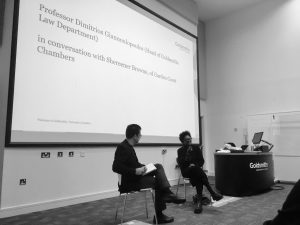 Students at the launch event had the opportunity to participate in a range of activities including Professor Dimitrios Giannoulopoulos (Head of Goldsmiths Law Department) in conversation with Shereener Browne, of Garden Court Chambers which helped raise awareness of pathways, career opportunities and provide an understanding of what it is like to study Law at Goldsmiths.
Students at the launch event had the opportunity to participate in a range of activities including Professor Dimitrios Giannoulopoulos (Head of Goldsmiths Law Department) in conversation with Shereener Browne, of Garden Court Chambers which helped raise awareness of pathways, career opportunities and provide an understanding of what it is like to study Law at Goldsmiths.
“There could not be a more urgent time to work with students in our local community, to create academic aspiration for them and enrich their confidence, experience and understanding of future career pathways, in Law and related subjects. Despite the invaluable efforts of teachers and schools, the pandemic will have substantially disrupted these students’ experience over the last 18 months; we have a civic responsibility to support the local synergies that will empower these students and catapult them into successful academic destinations.
As a Department of Law that was built on the foundation of the pursuit of equality and social justice, we are thrilled to join forces with the London Borough of Lewisham and our Widening Participation team, and grateful for the warm reception we’ve had from the students who have joined us for this launch. Judging from the energy in the room and participation tonight, this will be a most impactful programme and we can’t wait for the next opportunity to immerse students into Law as substantive knowledge and self-sustained system, with its own cultural norms, institutional attitudes and idiosyncratic methods.” – Professor Dimitrios Giannoulopoulos, Head of Goldsmiths Law Department.
Attendees also had an opportunity to hear from current Goldsmiths law students Tasnim and Oliver, who shared their own educational journeys and decisions with the current sixth formers. It was clear from the Q&A session that followed, just how much the audience valued the advice being given by all of the speakers.
“I’m really pleased that we are able to support such an engaging programme of events over the course of the year, strengthening our ties with local schools & colleges, the Borough of Lewisham and supporting our Civic responsibilities. We are really keen to help inspire students in Lewisham and it is evident that the speakers at the event did just that.” – Faye Yasmin. Widening Participation Manager.
Attending Year 12 pupils from schools and colleges across Lewisham included Sydenham, Forest Hill, Haberdashers Hatcham, Prendergast, Sedgehill and Knights Academy Sixths alongside students from Christ the King Colleges.
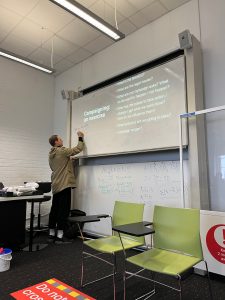 n international NGO that campaigns for fair and equal criminal justice systems. Their work involves research, campaigning for law reform, supporting strategic litigation and building partnerships with lawyers, activists, academics and other NGOs. Griff leads on Fair Trials’ work on the use of AI in criminal justice. Previously, he was a legal and policy officer at Big Brother Watch, where he investigated and challenged infringements of human rights as well as oppressive and discriminatory use of technology and data by the state, police and private companies.
n international NGO that campaigns for fair and equal criminal justice systems. Their work involves research, campaigning for law reform, supporting strategic litigation and building partnerships with lawyers, activists, academics and other NGOs. Griff leads on Fair Trials’ work on the use of AI in criminal justice. Previously, he was a legal and policy officer at Big Brother Watch, where he investigated and challenged infringements of human rights as well as oppressive and discriminatory use of technology and data by the state, police and private companies.
 Students at the launch event had the opportunity to participate in a range of activities including Professor Dimitrios Giannoulopoulos (Head of Goldsmiths Law Department) in conversation with Shereener Browne, of Garden Court Chambers which helped raise awareness of pathways, career opportunities and provide an understanding of what it is like to study Law at Goldsmiths.
Students at the launch event had the opportunity to participate in a range of activities including Professor Dimitrios Giannoulopoulos (Head of Goldsmiths Law Department) in conversation with Shereener Browne, of Garden Court Chambers which helped raise awareness of pathways, career opportunities and provide an understanding of what it is like to study Law at Goldsmiths.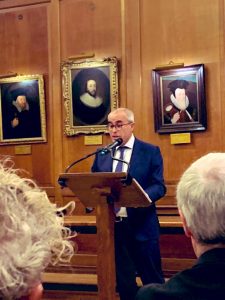
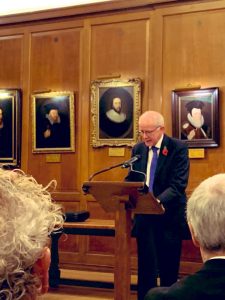
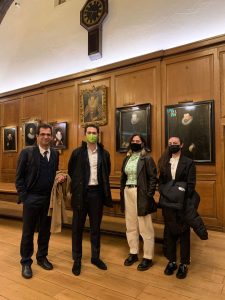
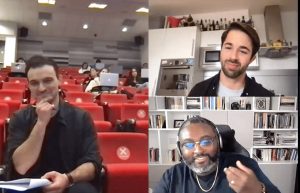
 Jessica Simor QC is a founding member of
Jessica Simor QC is a founding member of  Schona Jolly QC is the Chair of the Bar
Schona Jolly QC is the Chair of the Bar